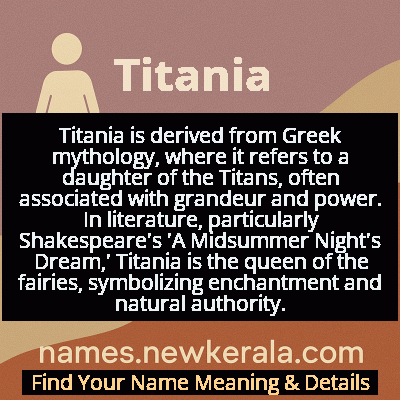Titania Name Meaning & Details
Origin, Popularity, Numerology Analysis & Name Meaning of Titania
Discover the origin, meaning, and cultural significance of the name TITANIA. Delve into its historical roots and explore the lasting impact it has had on communities and traditions.
Name
Titania
Gender
Female
Origin
Greek
Lucky Number
2
Meaning of the Name - Titania
Titania is derived from Greek mythology, where it refers to a daughter of the Titans, often associated with grandeur and power. In literature, particularly Shakespeare's 'A Midsummer Night's Dream,' Titania is the queen of the fairies, symbolizing enchantment and natural authority.
Titania - Complete Numerology Analysis
Your Numerology Number
Based on Pythagorean Numerology System
Ruling Planet
Moon
Positive Nature
Diplomatic, friendly, artistic, empathetic.
Negative Traits
Over-sensitive, moody, indecisive, prone to self-pity.
Lucky Colours
Green, cream, white.
Lucky Days
Monday.
Lucky Stones
Pearl, moonstone.
Harmony Numbers
1, 3, 4.
Best Suited Professions
Diplomats, mediators, caregivers, artists.
What People Like About You
Cooperative spirit, friendliness, artistic talent.
Famous People Named Titania
Titania (Mythological)
Mythological Queen
Queen of the Fairies in Shakespeare's 'A Midsummer Night's Dream'
Titania McGrath
Satirical Writer/Persona
Pseudonymous social media activist and author created by Andrew Doyle
Titania Hardie
Author
Australian author known for works on witchcraft, magic, and the occult
Name Variations & International Equivalents
Click on blue names to explore their detailed meanings. Gray names with will be available soon.
Cultural & Historical Significance
Extended Personality Analysis
Individuals named Titania are often perceived as possessing regal, commanding personalities with strong leadership qualities and natural authority. They tend to be creative, imaginative, and deeply connected to artistic or mystical pursuits, reflecting their namesake's fairy queen heritage. The name suggests someone who is both powerful and graceful, capable of great passion and determination when pursuing their goals. Their personality often combines intellectual depth with emotional intensity, making them compelling and sometimes intimidating figures. Like Shakespeare's character, they may possess a certain theatrical flair and dramatic presence, often excelling in creative fields or leadership positions where their natural charisma can shine. They're typically independent thinkers who value their autonomy and aren't afraid to challenge conventions or stand up for their beliefs, much like the Titans who defied the established order of the Olympian gods. At the same time, those named Titania often display a protective, nurturing side, particularly toward those they perceive as vulnerable or in need of guidance. This combination of strength and compassion makes them both respected and beloved by those in their circles. Their connection to the name's mythological roots often manifests as an interest in history, literature, or the occult, and they may feel a special affinity for nature and environmental causes, echoing the elemental power of their Titan namesakes.
Modern Usage & Popularity
In contemporary times, Titania remains an uncommon but distinctive choice for baby girls, particularly among parents seeking names with literary, mythological, or fantasy connections. The name has never ranked in the top 1000 names in the United States, maintaining its rarity and exclusive appeal. Its usage saw a slight increase following the popularity of fantasy literature and films in the late 20th and early 21st centuries, with parents drawn to its strong feminine energy and classical roots. Modern parents choosing Titania often appreciate its association with powerful female figures and its balance of elegance and strength. The name is particularly popular in artistic and literary circles, where its Shakespearean heritage is valued. While still unconventional, Titania offers the appeal of being recognizable due to its literary fame while remaining sufficiently rare to ensure individuality. In recent years, the name has found some popularity in the United Kingdom and Australia, where Shakespearean names traditionally have stronger cultural resonance. The rise of fantasy media and the trend toward unique, meaningful names has positioned Titania as an attractive option for parents seeking something both classic and distinctive that carries significant cultural and literary weight without being overly common.
Symbolic & Spiritual Meanings
Symbolically, Titania represents feminine power, mystical authority, and natural sovereignty. The name embodies the concept of 'giant' not merely in physical stature but in terms of influence, presence, and spiritual magnitude. It symbolizes the primordial forces of nature, creativity, and transformation—qualities associated with both the original Titans and Shakespeare's fairy queen. Titania also represents the balance between power and grace, authority and compassion, reality and enchantment. In psychological terms, the name suggests someone who bridges different realms of experience—the practical and the magical, the earthly and the ethereal. The symbolic meaning extends to themes of independence, particularly feminine autonomy, as both the mythological Titans and Shakespeare's character demonstrate defiance against established authority figures. Titania symbolizes the wild, untamable aspects of nature and personality that resist conventional constraints. Her association with the fairy realm connects her to themes of illusion, dreams, and the subconscious, representing the power of imagination to transform reality. The name carries connotations of protection and guardianship, reflecting both the Titans' role as primordial creators and Shakespeare's Titania's fierce protection of the changeling boy. Ultimately, Titania symbolizes the integration of immense power with deep emotional connection—the ability to command respect while maintaining compassion and nurturing relationships.

